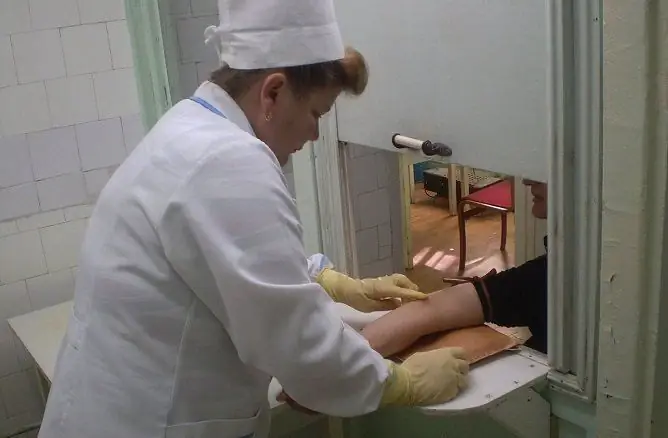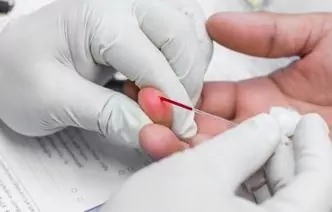HIV test: where and how you can take it, types of tests, evaluation of the result
The content of the article:
- Indications for analysis
- Where to get tested and how to prepare for it?
-
What are the methods for detecting HIV infection called?
- ELISA
- Immune blotting
- PCR
- Express analyzes
- Can HIV be diagnosed with a complete blood count?
An HIV test can be used to determine if the human immunodeficiency virus is present in the body.
HIV infection - infection with the human immunodeficiency virus (HIV), which causes the development of acquired deficiency syndrome (AIDS), a disease characterized by suppression of cellular immunity.
HIV infection occurs mainly through sexual contact with unprotected sexual intercourse, the pathogen can also be transmitted through infected blood during medical manipulations and through the vertical route, i.e., from mother to child through the placenta during pregnancy.

An HIV test can be taken anonymously, but in this case the result is reported only orally
Moving with the bloodstream through the body, viral particles infect cells responsible for the formation and maintenance of immunity. The main target is cells that have the main viral CD4 receptors on their surface (T-lymphocytes, macrophages, monocytes and dendritic cells). The virus changes the genetic code of cells and tunes them to work for its own replication. By actively multiplying in the affected cells, HIV gradually destroys the immune system, reducing the body's resistance to infections. AIDS, the active stage of HIV infection, is characterized by a sharp decrease in the number of lymphocytes, extensive lesions by opportunistic infections, and in some cases by the formation of malignant tumors.
The disease is characterized by a long latency period, from the moment of infection to the appearance of the first clinical signs, it takes from three weeks to three months, and sometimes more.
Indications for analysis
An HIV test is taken in the following cases:
- preparation for hospitalization or surgery;
- planning pregnancy;
- registration with a antenatal clinic;
- accidental unprotected sexual contact;
- a sharp decrease in weight by more than 10%;
- activation of lymph nodes in different areas;
- lymphoma of the brain or spinal cord;
- diseases of the blood system, leukopenia and lymphopenia;
- cervical cancer;
- Kaposi's sarcoma;
- diseases requiring aggressive immunosuppressive therapy;
- prolonged course or frequent occurrence of any disease, indicating immunodeficiency.
An HIV test result is valid for 90 days.
Where to get tested and how to prepare for it?
Where can I get tested? You can get a referral for analysis from your GP or fill out an analysis request at a private clinic. An HIV test can also be performed anonymously, but in this case, the result is reported only orally, that is, a certificate is not issued.
Preparation for serological research includes abstinence from sexual activity, alcohol intake, fatty and salty foods, smoking during the day. Testing is performed using venous blood, which is taken in the morning on an empty stomach.
What are the methods for detecting HIV infection called?
There are several methods with varying reliability.
ELISA
Enzyme immunoassay (ELISA) - determination of the quantitative content of the virus in the blood serum. The method is based on the detection of antibodies that are formed in response to the penetration of the pathogen into the body. Due to the existence of the so-called seronegative window, the period when antibodies are not detected in the blood, it is advisable to conduct the study no earlier than 3-4 weeks after infection, with a repeat after 3 and 6 months in case of a negative result.
The test result can be positive if the virus is detected, negative or doubtful.
Could the result of this HIV test be wrong? Indeed, a false positive result is possible, therefore, the conclusion about the presence of HIV infection is made only after repeated verification by more reliable methods.
Immune blotting
Immune blotting is a more sensitive and specific way of detecting HIV, which is a modification of ELISA with preliminary electrophoretic separation of virus proteins. The method allows to confirm the presence of antibodies to the proteins of the envelope and core of viral particles in the studied serum. If the reaction proceeds with only one of the coat proteins, the result is considered questionable.
PCR
Polymerase chain reaction (PCR) is a method for detecting the DNA and RNA of the immunodeficiency virus in the body. Whole blood is used for qualitative PCR analysis; blood plasma is examined for the quantitative method. The quantitative method in dynamics allows you to determine the activity of the virus and the effectiveness of the therapy. Unlike ELISA, PCR can be taken as early as 7-10 days after a possible infection.
How much does a blood test for HIV take? The deadline for the readiness of the ELISA result is one working day, in case of urgent diagnostics, the answer will be received within a few hours. The preparation of results in government laboratories can vary widely in time: it usually takes from two weeks to a month. Diagnosis by immune blotting takes 3 to 10 days. PCR results can be viewed in 10-14 days.

Express HIV test can be performed independently, the result will be ready within a few minutes
Express analyzes
Rapid HIV testing can be done at home. The result can be assessed in a few minutes. Immunochromatographic express tests designed for the simultaneous detection of antibodies to HIV, hepatitis and syphilis have a high degree of reliability.
Can HIV be diagnosed with a complete blood count?
A complete blood count is not able to diagnose HIV infection. But changes in blood parameters (lymphopenia or lymphocytosis, increased ESR, deviation from the norm of leukocytes and erythrocytes, the appearance of atypical mononuclear cells) can serve as an indirect indication of immunodeficiency, which gives reason to prescribe additional studies.
YouTube video related to the article:

Anna Kozlova Medical journalist About the author
Education: Rostov State Medical University, specialty "General Medicine".
Found a mistake in the text? Select it and press Ctrl + Enter.







